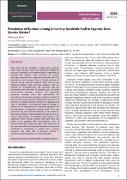Prevalence of Burnout among University Academic Staff in Uganda; Does Gender Matter?
Abstract
More than half the educators in high-income countries
suffer from burnout, which has detrimental effects for
lecturers’ wellbeing, to the effectiveness of institutions of
learning and students ’ care outcomes. In Uganda,
although suspected due to high reported levels of lecturer
absenteeism and turnover, there is limited evidence of
burnout among university academic staff. There is now
sufficient evidence that university academic staff are
strained by competitiveness, job insecurity and the
accelerated work demands of academic jobs, including
tenure-related demands, research and publication
pressures, teaching loads, few opportunities for
promotion and excessive paperwork which may lead to
burnout. This study aimed to estimate the prevalence of
burnout in a national sample of lecturers in Uganda using
used a descriptive cross-sectional research design. A
sample of 358 respondents was randomly selected from
the population of university academic staff. Data was
collected using the Professional Quality of Life version 5.
Descriptive statistics and independent-sample t-test were
used in data analysis. All statistics were tested at .05
significant levels. Results showed that more than half
(58%) of the academic staff had moderate levels of
burnout while 38% of them had high f levels of burnout. It
was recommended that Employee Assistance Program be
established in universities in Uganda. Also to relieve
pressures that could lead to burnout, training in
emotional-social competencies is recommended
Collections
- Research Articles [54]

